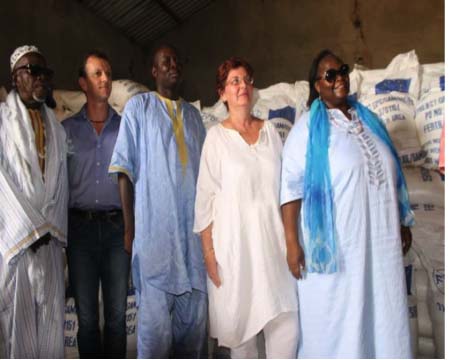
The fertilizer provided by the MDG 1c project through FAO is for the regions targeted by the MDG 1c programme namely, North Bank Region, Central River Region and Upper River Region.
This was announced by Agnès Guillaud, chargé d’affaires a.i. at the Delegation of the European Union to The Gambia on Wednesday 18 June in Buniadu village in the North Bank Region.
The occasion was the launching of the MDG 1c project for “improving food security through crop production intensification and school feeding programme.”
The project falls under the current Gambia-EU cooperation programme, and includes the provision of 100 metric tonnes of certified seeds.
In a statement delivered at the ceremony, the EU official recalled that the MDGs were officially set by the UN in 2000 when the UN member states agreed to achieve these goals by the year 2015.
However, it was clear by 2010 that this will not be so, and so the European Union created a 1 billion euro MDG Initiative fund to provide additional development assistance to countries most at risk of not attaining the MDGF goals in Africa, Caribbean and the Pacific (ACP).
In 2013, The Gambia received a 7.6 million euro grant (more than D400 million) from the MDG Initiative fund to tackle food insecurity, which is MDG 1c.
“It was agreed with the government of the Gambia that the EU funded programme would be implemented through separate agreements with two of its long-term partners: FAO and WFP.
“In 2013, agreements were signed with both partners. WFP is implementing the school feeding component, and the FAO is working towards increasing national agricultural production (both in quantity and quality) with a view to improve farmers income, but also eventually to make excess foodstuff available for school feeding, among others.
Ms Guillaud in her statement said, “according to the Gambia National Agricultural Investment Programme (GNAIP), agriculture has the potential to contribute significantly to the attainment of the MDGs in the Gambia, but the current level of productivity of the sector is well below the growth required to tackle food insecurity and poverty.
“Therefore, The Gambia has set a target of 6% annual growth in agricultural production in an effort to achieve the MDG linked to agriculture.”


